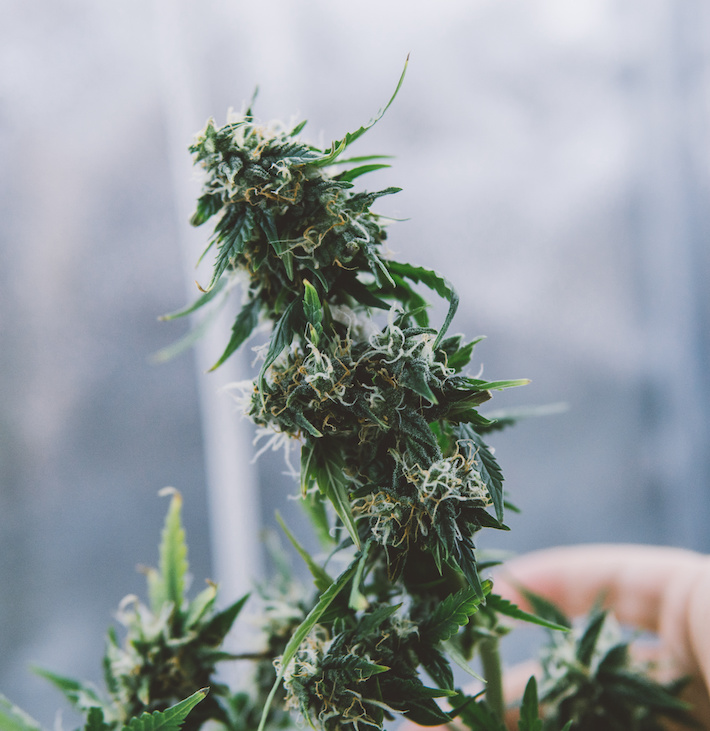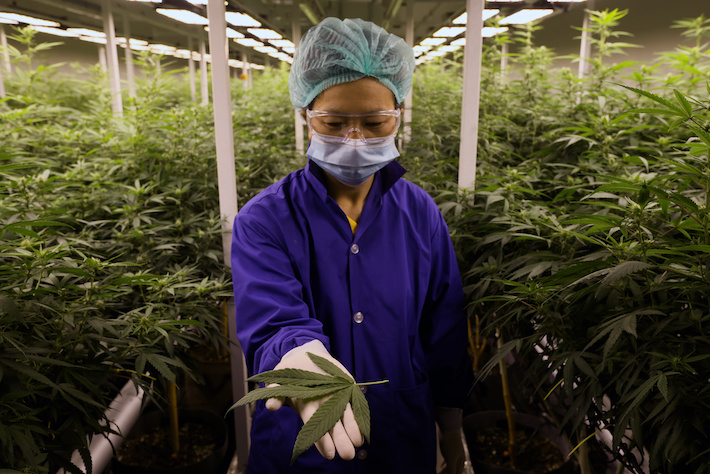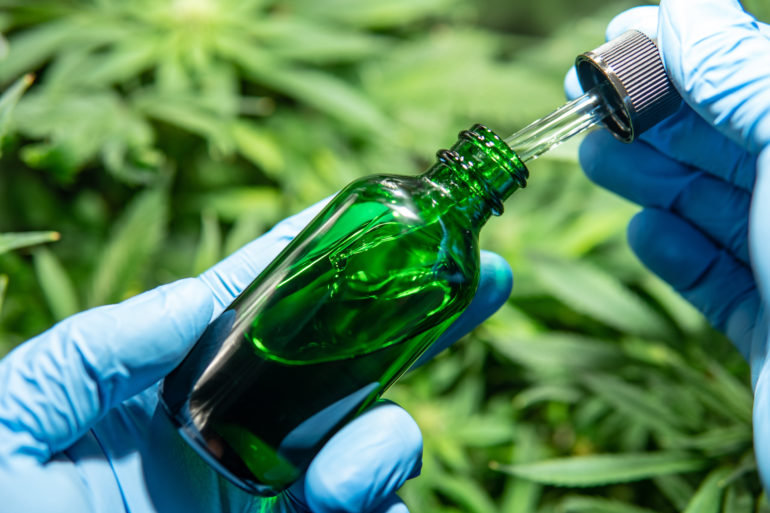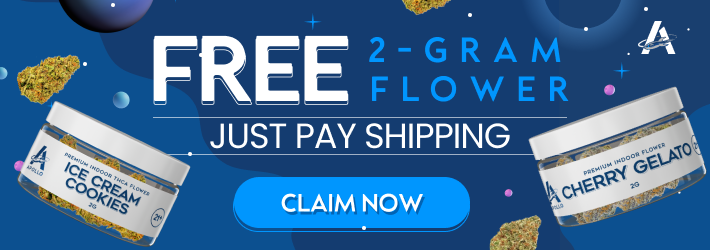CBDQ and similar oxidized derivatives of CBD are gaining attention for their potential use in cancer, obesity, fibrosis, and diabetes. Like its parent, CBDQ is non-intoxicating and has clearer anticancer activity than THC or CBD, but nothing else is known about its effects on humans.
CBD is generally well-tolerated, but there are no clinical indications, safety, or tolerability data for using CBDQ yet. CBDQ may cause similar drug interactions or liver toxicity.
What Is CBDQ?
CBDQ, cannabidiol quinone aka CBDHQ or HU-331, was first synthesized in 1968, when scientists wanted to know what makes hash turn purple. It forms when CBD is naturally oxidized or metabolized by air, heat, synthesis, and even digestion.

CBDQ may arise naturally, but far too slowly to be appreciably extracted or practically used. Thus, pharmaceutical researchers are developing promising synthetic CBDQ derivatives.
However, new manufacturers are bringing alleged organic CBDQ onto the market. Buyer beware because they aren’t regulated like dispensary products.

CBDQ vs. THC: Key Differences
- CBDQ doesn’t cause a high or the same physiologic side effects as THC
- THC is abundant in state-legal marketplaces and medically recommendable, while CBDQ is usually a trace substance or vaping byproduct
- Pure THC is commonly available, but pure CBDQ is often synthetic, sold to labs, and not for human consumption
CBDQ vs. CBD: Key Differences
- CBD products are plentiful, but CBDQ products are new and exceedingly rare
- CBD is best known for its host of medical benefits, and one pure CBD pharmaceutical is FDA-approved
- Side effects of CBD are well-documented, but CBDQ’s are unknown other than possible drug interactions

What Are the Benefits and Effects of CBDQ?
CBDQ and derivatives (VCE-004 series) are being actively investigated for a few, mostly cancer-related potential therapeutic effects, including:
- Anticancer effects: Robust activity against topoisomerase II, angiogenesis, multiple cancer cell lines and animal tumors (e.g., breast, lymphoma, pancreatic, glioblastoma, melanoma, and colorectal cancer). May be synergistic with cisplatin and chemo drugs.
- Appetite and Weight: Increases in mice with cancer. Reduced weight, body fat, triglycerides, liver stenosis in healthy mice fed a high-fat diet.
- Diabetes: May improve insulin sensitivity.
- Anti-fibrotic: Systemic sclerosis and other fibrotic diseases
What Are the Side Effects of CBDQ?
The short and long-term side effects of CBDQ aren’t fully studied or truly known, neither in animals nor humans. We know more about what CBDQ doesn’t do in terms of side effects, rather than what it does.
Back in 2007, there was a mouse study to see if there were cardiac side effects comparable to doxorubicin, a chemotherapy drug known for its negative cardiovascular effects. Investigators found that CBDQ does not have cardiotoxicity in mice, and so it may have an advantage. But this hasn’t yet been clinically studied.
Vaping CBD can create different redox species like CBDQ – which could carry risky side effects. Computer models indicate that inhaled CBDQ from commercial CBD vape products may cause pro-inflammatory, altered protein function, and stressful cellular effects. Still, the clinical significance of all this is to be determined.
- There is not enough data to say whether CBDQ side effects are approximate to common CBD oil side effects, but it is possible since they are found together and directly related
- CBDQ may cause unknown side effects directly, liver toxicity, or drug-drug interactions with enzyme families like CYP450, similar to CBD
- CBD vapes can get hot and generate CBDQ and other free radicals, which can be harsh on the airways and have separate side effects
How Much CBDQ Should You Take?
Currently, there is zero clinical data to suggest what a therapeutic or “good” dose of CBDQ is for us humans. All the studies are focused on mice and test tubes, which don’t directly translate to therapeutic human doses.
With this caveat in mind, CBDQ is studied in mice to have positive effects at doses ranging from 7.5 mg/kg/week up to 15 mg/kg/week. A smaller, one time dose of 2.5 mg/kg was notably less effective than 5 mg/kg 3 times weekly.
Weight-based dosing in humans is typically used in pediatric populations, such as with Epidiolex® (pure pharmaceutical CBD). However, CBDQ data is extremely limited by contrast and outright nonexistent for human dosing.
Ask your healthcare provider first, and consider asking a cannabis coach too, for tips on what cannabinoids, products, and formulations are more accessible and may work best for you.
Will CBDQ Get You High?
No, CBDQ won’t get you high. In general, there is no evidence to suggest that any similar minor cannabinoids have intoxicating features. We know this because CBDQ and others lack a key structural component (double bond) that intoxicating cannabinoids like THC and THCP have.
Similar nonintoxicating cannabinoids like CBD and CBDV can improve mood and well-being by slowing the breakdown of, and increasing levels of anandamide (AEA). AEA is an endocannabinoid that naturally causes good feelings, particularly after exercise. Since CBDQ slows down the same enzymes, it may bring a similar AEA and mood boost.
Will CBDQ Show Up on a Drug Test?
Yes, CBDQ can show up on a drug test, but it is very unlikely. CBDQ is also known to be a liver-made metabolite of CBD. Modern drug testing research estimates a 1–2% chance of cross-reactivity with CBD metabolites.
Although drug screens are primarily looking for THC metabolites, CBD products can potentially trigger an initial positive test. Consumers should know that cannabis and hemp products can carry trace amounts of THC that can alter results.
Conclusion
Physics tells us that when molecules are oxidized, they normally lose energy and reactivity – even cannabinoids. But quinone compounds like CBDQ are special.
CBDQ is an oxidized form of CBD with less overall potential so far, but surprises us with promising anticancer effects yet to be studied in people.
References
- Caprioglio, D., Mattoteia, D., Pollastro, F., Negri, R., Lopatriello, A., Chianese, G., Minassi, A., Collado, J. A., Munoz, E., Taglialatela-Scafati, O., & Appendino, G. (2020). The Oxidation of Phytocannabinoids to Cannabinoquinoids. Journal of Natural Products, 83(5), 1711–1715. https://doi.org/10.1021/acs.jnatprod.9b01284
- Walsh, K. B., McKinney, A. E., & Holmes, A. E. (2021). Minor Cannabinoids: Biosynthesis, Molecular Pharmacology and Potential Therapeutic Uses. Frontiers in Pharmacology, 12, 777804. https://doi.org/10.3389/fphar.2021.777804
- Vikingsson, S., Hart, E. D., Winecker, R. E., Cone, E. J., Kuntz, D. J., Clark, M., Jacques, M., Hayes, E. D., & Flegel, R. R. (2023). Prevalence of ∆8-tetrahydrocannabinol carboxylic acid in workplace drug testing. Journal of Analytical Toxicology, bkad068. https://doi.org/10.1093/jat/bkad068
- Souza, J. D. R., Pacheco, J. C., Rossi, G. N., de-Paulo, B. O., Zuardi, A. W., Guimarães, F. S., Hallak, J. E. C., Crippa, J. A., & Dos Santos, R. G. (2022). Adverse Effects of Oral Cannabidiol: An Updated Systematic Review of Randomized Controlled Trials (2020–2022). Pharmaceutics, 14(12), 2598. https://doi.org/10.3390/pharmaceutics14122598
- Benavides, A. (2023, May 24). Piecing Together the Endocannabinoidome: Charting the Next Frontier. Cannabis Central. https://www.veriheal.com/blog/piecing-together-the-endocannabinoidome-charting-the-next-frontier/
- Benavides, A. (2021, October 25). All About Anandamide: Taking Cannabinoid Treatment to New Heights. Cannabis Central. https://www.veriheal.com/blog/what-is-anandamide/
- Carkaci-Salli, N., Raup-Konsavage, W. M., Karelia, D., Sun, D., Jiang, C., Lu, J., & Vrana, K. E. (2023). Cannabinoids as Potential Cancer Therapeutics: The Concentration Conundrum. Cannabis and Cannabinoid Research. https://doi.org/10.1089/can.2022.0344
- del Río, C., Navarrete, C., Collado, J. A., Bellido, M. L., Gómez-Cañas, M., Pazos, M. R., Fernández-Ruiz, J., Pollastro, F., Appendino, G., Calzado, M. A., Cantarero, I., & Muñoz, E. (2016). The cannabinoid quinol VCE-004.8 alleviates bleomycin-induced scleroderma and exerts potent antifibrotic effects through peroxisome proliferator-activated receptor-γ and CB2 pathways. Scientific Reports, 6, 21703. https://doi.org/10.1038/srep21703
- Emerald Health Pharmaceuticals. (2022). A Phase IIa, Open-label, Multicentre Dose-Finding Trial in Patients With Relapsing Forms of Multiple Sclerosis (RMS) to Evaluate the Safety, Tolerability and Preliminary Efficacy of EHP-101 (Clinical Trial Registration NCT04909502). clinicaltrials.gov. https://clinicaltrials.gov/study/NCT04909502
- Emerald Health Pharmaceuticals. (2023). A Phase IIa, Double-Blind, Randomised, Intracohort Placebo-Controlled, Multicentre Study to Evaluate the Safety, Tolerability and Preliminary Efficacy of EHP-101 in Patients With Diffuse Cutaneous Systemic Sclerosis (Clinical Trial Registration NCT04166552). clinicaltrials.gov. https://clinicaltrials.gov/study/NCT04166552
- García-Martín, A., Garrido-Rodríguez, M., Navarrete, C., Del Río, C., Bellido, M. L., Appendino, G., Calzado, M. A., & Muñoz, E. (2018). EHP-101, an oral formulation of the cannabidiol aminoquinone VCE-004.8, alleviates bleomycin-induced skin and lung fibrosis. Biochemical Pharmacology, 157, 304–313. https://doi.org/10.1016/j.bcp.2018.07.047
- Karelia, D., Corey, Z., Wang, H., Raup-Konsavage, W. M., Vrana, K. E., Lü, J., & Jiang, C. (2023). Library Screening and Preliminary Characterization of Synthetic Cannabinoids Against Prostate and Pancreatic Cancer Cell Lines. Cannabis and Cannabinoid Research. https://doi.org/10.1089/can.2022.0270
- Kogan, N. M., Peters, M., & Mechoulam, R. (2021). Cannabinoid Quinones—A Review and Novel Observations. Molecules, 26(6), 1761. https://doi.org/10.3390/molecules26061761
- Kogan, N. M., Schlesinger, M., Peters, M., Marincheva, G., Beeri, R., & Mechoulam, R. (2007). A Cannabinoid Anticancer Quinone, HU-331, Is More Potent and Less Cardiotoxic Than Doxorubicin: A Comparative in Vivo Study. Journal of Pharmacology and Experimental Therapeutics, 322(2), 646–653. https://doi.org/10.1124/jpet.107.120865
- Kogan, N. M., Schlesinger, M., Priel, E., Rabinowitz, R., Berenshtein, E., Chevion, M., & Mechoulam, R. (2007). HU-331, a novel cannabinoid-based anticancer topoisomerase II inhibitor. Molecular Cancer Therapeutics, 6(1), 173–183. https://doi.org/10.1158/1535-7163.MCT-06-0039
- Love, C. A., Kim, H.-Y. H., Tallman, K. A., Clapp, P. W., Porter, N. A., & Jaspers, I. (2023). Vaping Induced Cannabidiol (CBD) Oxidation Product CBD Quinone Forms Protein Adducts with KEAP1 and Activates KEAP1-Nrf2 Genes. Chemical Research in Toxicology, 36(4), 565–569. https://doi.org/10.1021/acs.chemrestox.3c00038
- Lynch, T., & Price, A. (2007). The Effect of Cytochrome P450 Metabolism on Drug Response, Interactions, and Adverse Effects. American Family Physician, 76(3), 391–396.
- Navarrete, C., García-Martin, A., Garrido-Rodríguez, M., Mestre, L., Feliú, A., Guaza, C., Calzado, M. A., & Muñoz, E. (2020). Effects of EHP-101 on inflammation and remyelination in murine models of Multiple sclerosis. Neurobiology of Disease, 143, 104994. https://doi.org/10.1016/j.nbd.2020.104994
- Palomares, B., Ruiz-Pino, F., Navarrete, C., Velasco, I., Sánchez-Garrido, M. A., Jimenez-Jimenez, C., Pavicic, C., Vazquez, M. J., Appendino, G., Bellido, M. L., Calzado, M. A., Tena-Sempere, M., & Muñoz, E. (2018). VCE-004.8, A Multitarget Cannabinoquinone, Attenuates Adipogenesis and Prevents Diet-Induced Obesity. Scientific Reports, 8, 16092. https://doi.org/10.1038/s41598-018-34259-0
- Raup-Konsavage, W. M., Johnson, M., Legare, C. A., Yochum, G. S., Morgan, D. J., & Vrana, K. E. (2018). Synthetic Cannabinoid Activity Against Colorectal Cancer Cells. Cannabis and Cannabinoid Research, 3(1), 272–281. https://doi.org/10.1089/can.2018.0065
- Trac, J., Keck, J. M., & Deweese, J. E. (2021). Cannabidiol oxidation product HU-331 is a potential anticancer cannabinoid-quinone: A narrative review. Journal of Cannabis Research, 3, 11. https://doi.org/10.1186/s42238-021-00067-z
- Ujváry, I., & Hanuš, L. (2016). Human Metabolites of Cannabidiol: A Review on Their Formation, Biological Activity, and Relevance in Therapy. Cannabis and Cannabinoid Research, 1(1), 90–101. https://doi.org/10.1089/can.2015.0012
- Wilson, J. T., Fief, C. A., Jackson, K. D., Mercer, S. L., & Deweese, J. E. (2018). HU-331 and Oxidized Cannabidiol Act as Inhibitors of Human Topoisomerase IIα and β. Chemical Research in Toxicology, 31(2), 137–144. https://doi.org/10.1021/acs.chemrestox.7b00302

